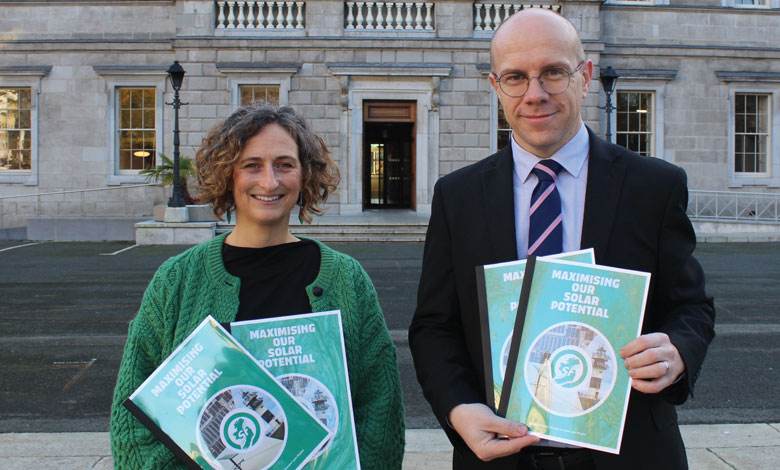
Reforming electricity markets: A global perspective
15th December 2023
Back to the future: The opportunities of a net zero Northern Ireland
20th November 2023Darren O’Rourke TD: Sinn Féin’s energy priorities

Sinn Féin’s spokesperson for environment and climate action, Darren O’Rourke TD, talks to Joshua Murray about the party’s vision for a “just and ambitious” energy transition.
Joshua Murray (JM): What is Sinn Féin’s analysis of the Government’s environment, climate, and energy policy announcements in Budget 2024?
Darren O’Rourke (DO’R): Budget 2024 reaffirmed the Government’s commitment to a climate strategy that is both regressive and inadequate.
Even if the Government was meeting targets, they are nowhere near ambitious enough to deliver at the pace and scale needed to rapidly reduce emissions, nor are they radical enough to ensure that our vast natural resources are translated into national wealth for all, and that those on the lowest incomes are not left behind in the transition to net zero.
Sinn Féin would increase investment in the energy transition by €293 million. What we need is an ambitious, state-led, just transition where communities right around the country benefit from the renewable energy transition, improved public transport, warmer homes, and sustainable living.
Instead of realising the potential of our renewable resources and maximising the potential state and community benefit of this, our electricity sector is, in fact, the worst performing of all sectors. 49.3 per cent of the 2021-2025 carbon budget has been used in the first two years, and we are on track to exhaust 123 per cent of the allocated carbon budgets by 2030.
Retrofitting people’s homes has the potential to be a key means of cutting carbon emissions while simultaneously lowering ordinary workers and families energy costs. Despite this, the Government remains determined to stick with their plan that has been roundly criticised as not fit for purpose. Not only is it progressing at a snail’s pace, but the Government’s schemes remain the almost exclusive preserve of those with the most means, locking out low and middle income earners.
Sinn Féin would radically overhaul the Government’s scheme, changing how it is funded, targeted, and delivered. We would invest an additional €152 million for residential and community retrofits, as well as an additional €43.5 million for local authority homes and a dedicated scheme for solid fuel homes.
We must prioritise climate justice and delivering a transition. As well as measures to address wealth-related emissions, we plan to tackle the high cost of electricity and consequent high levels of energy poverty. It is high time that this chaos was reined in, and that ordinary workers, families, and hard-pressed businesses are given the relief they need.
This would require an investment of €415 million. Alongside an energy price cap to reduce the cost of electricity, our plans would ensure that the Commission for the Regulation of Utilities is resourced properly.
To address energy poverty more specifically, we also propose the establishment of a civil society engagement unit as part of the energy poverty steering group ensuring that they are guaranteed a seat at the table and are seriously engaged with rather than being consulted as part of a tick box exercise. We would also establish a local energy advisor scheme, which is a key recommendation of NGOs in the sector, and increase and ring-fence funding for smart heating control grants.
JM: What specific changes would a Sinn Féin government make to the Climate Action Plan?
DO’R: Wealthy people have more responsibility for emissions, but the Government is not doing enough to track and stop it. Sinn Féin remains resolute in its commitment to addressing emissions associated with wealth. The party has long advocated for a wealth tax, a private jet tax, the removal of tax credits on a tapered basis for individuals with an income exceeding €100,000, and the implementation of a second home levy.
By recognising the unequal contributions to the climate crisis and implementing targeted policies that address the emissions of the wealthy, we can establish a fairer, more effective, and economically efficient approach to climate action. Sinn Féin remains steadfast in its commitment to combating climate change with justice and equity at the forefront.
JM: How would Sinn Féin seek to adequately resource state bodies such as An Bord Pleanála/An Coimisiún Pleanála and the CRU?
DO’R: The Irish planning system is not fit for purpose. It is slow, adversarial, and racked with uncertainty. Alongside grid capacity, it remains one of the key barriers to the rollout of renewables and the transition to net zero.
Despite the statutory timeframe [for a decision] being 18 weeks, many renewables projects are stuck in the planning system for over a-year-and-a-half; the average wait time for a decision is 92 weeks. As a result, progress is stunting. It is abundantly clear that a step change is needed. This is why we proposed to hire 30 new staff to address this issue specifically, with new hires that hold significant expertise in environmental planning in particular.
Similarly, to ensure Ireland’s offshore wind potential is not squandered, we would make resources available to 15 to 20 new staff in MARA. Informed by a Strategic Workforce Plan and Skills Needs Assessment, these new staff would have specific expertise in climate action and biodiversity including ecologists, marine biologists, ornithologists.
To assist with efforts to tackle the crisis in biodiversity, we well as a new capital fund of €12 million to expand and restore national parks and, we would increase current staffing spend by €2 million to ensure that the NPWS are adequately equipped to carry out this work.
With reference to the CRU, as well new legislation to give the CRU the mandate and regulatory teeth to regulate standing charges, hedging and anti-competitive behaviour, we would also legislate to mandate them to consider energy affordability in their policy direction as well as increased reporting responsibilities. As well as these responsibilities, the CRU’s existing mandate is broad, and they have numerous responsibilities including many that relate to the green transition as the energy regulator. Therefore we would dedicate an additional €2.9 million for staffing and resourcing of the CRU.
JM: What is Sinn Féin’s vision for the role of the State with regard to the implementation of energy policy?
DO’R: Sinn Féin believes that a fair funding model should be at the heart of the transition to an affordable, secure, and democratic decarbonised electricity system. The current funding model is structured in a manner which puts a disproportionate burden on lower income households, as well as stifling the pace, scale, and diversity of the renewable energy transition.
We would allow for general taxation to supplement the funding that comes from the PSO levy to finance a more ambitious renewables programme. Expanding the role of exchequer-funded renewable energy supports is central to our aims of investing in renewable generation at a scale, pace, and diversity necessary to maximise longer-term socioeconomic benefits and national wealth without excessively impacting on consumer in the short term.
If we were to use exchequer funding to finance the additional costs of ensuring that 10 per cent of new generation is community-owned by 2030, this could see between €50 million and €60 million come from general taxation instead of consumer bills.
As the PSO component of energy bills is expected to grow with the expansion of renewables, so too does the need for a fairer funding model. With households accounting for a disproportionate share of PSO levy costs, it is lower income households that shoulder a particularly unfair portion of the burden. The PSO is currently charged at a flat rate for every household regardless of income or electricity usage, making it both socially regressive and environmentally indiscriminate.
The distribution and design of the PSO levy must be reformed to a more socially progressive and environmentally effective model. Adopting per-unit charges could provide the dual advantage of reducing the undue cost burden on the lowest income households and shifting it to high energy users. In Austria, for instance, there are exemptions from payment of levies to support renewable energy based on household income and household size. These measures would be in addition to our wider social protection package for energy.
Before the current energy crisis, network charges accounted for around a third of electricity costs. As such, the design and distribution of network charges has a sizeable impact on electricity bills. As with the PSO levy, the current structure and distribution of network charges is both socially and environmentally regressive.
In 2010, a decision was taken by the then-Minister for Energy [Eamon Ryan TD], who is also the current minister responsible for energy policy, to direct the CRU to redistribute network charges in a way which reduced costs for large energy users by hiking the charges paid by households – to the tune of an additional €50 million per year. Despite the obvious flaws, this arrangement has remained in place for over 10 years, surviving the tenure of five governments. Sinn Féin would have put an end to this subvention immediately. In the absence of direct action by the Minister to direct the removal of an abhorrent policy he initiated, the CRU have now stepped in to unwind it. This is over a decade too late. Since its introduction, it has been estimated that this subvention has added an additional €600 million to household bills; around €480 per household.
The State should lead in delivering the investment necessary to accelerate the transition to renewable energy and to capture its full benefits. Ensuring that targeted funding streams are in place to support the delivery of projects that are key to our climate targets, energy security, and long-term economic prosperity.
At present just one port in Ireland – Belfast – is capable of hosting the construction of offshore wind farms. If we do not invest in and ready more of our ports now, we will lose the jobs and supply chain business from these multi-billion-euro projects to other states.
We would expand public ownership of renewables via state bodies such as ESB, Bord na Móna, and Coillte by revising their existing financial and governance mechanisms, and empowering them to maximise their role in the transition to a decarbonised energy system.
Significant state investment is required to achieve our 2030 targets in renewable energy production. Unlike the current government, Sinn Féin believes that public investment should yield public dividends that can then be utilised for public good.
JM: How can the remit of the Minister of Further and Higher Education, Research, Innovation and Science be enhanced?
DO’R: The energy transition represents a great challenge, but it also represents a great opportunity. There is the potential to create tens of thousands high quality jobs here as part of the roll out of renewables. However, the success of this is not a given. Instead it requires decisive and determined action from both the public and private sector. This includes important roles for the Minister of Further and Higher Education, Research Innovation and Science and for the Minister for Enterprise, Trade and Employment.
While we welcome the work that the Government has done more recently to develop and nurture green skills here, they do not go far enough and if things continue as they are, there will be significant gaps between what we have and what we need. Bridging the skills gap requires the Government to lead from the front on this, ensuring the universities, colleges, technical institutions, businesses and so on, are equipped with the necessary skills and resources to transition to net zero.

